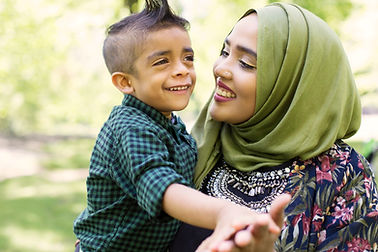_edited.png)

MINDFULNESS & AWARENESS
Mental Health Literacy Program
The Big Connect is a 3-year integrated health program, which aims to support the mental health and wellbeing of Victoria’s young people. This program is part of the Future Healthy initiative. Evidence shows that building and maintaining meaningful social connections is important to help children, young people and their families build their mental wellbeing, including their resilience to future challenges and decrease their likelihood of developing longer term ill health. (McPherson et al., 2014, Surkalim et al., 2019, Tollit et al., 2017)
The ongoing challenges of coronavirus, and a rapidly changing world, mean our collective health and wellbeing has never been more important, and young people across Victoria have been hardest hit. In addition, young people from CALD backgrounds face added barriers in addressing mental health challenges. These include racism and discrimination, stigma and shame associated with mental illness, and lack of access to relevant mental health literacy and awareness. Research tells us more can be done to support the mental health of migrant and refugee young people. To do this, tailored approaches are required to promote mental health, raise awareness and reduce
stigma in CALD communities.
MENTAL HEALTH LITERACY
Awareness of how to achieve and maintain good mental health. Knowledge about mental health, implying access to information and understanding that information.
To obtain and maintain good health, namely the skills needed to promote mental health and well-being and reduce the impact of mental issues/illness.

01
Emotional Wellbeing
We also recognise that we live in a multicultural world, and wellness encompasses areas that may not be specified in this brief discussion. We believe, for example, that trauma is a universal human experience, and that our culture and spiritual beliefs impact our perceptions and everything we do. In summary, wellness is about how we live our lives and the joy and fulfilment and health we experience.
A society whose way of life is characterised by one of the pair would likely be very different from another society that lives by the alternative. The more these sorts of differences occur, the wider the cultural differences between cultures. Therefore, values serve as a potent way of comparing cultures and observing the similarities and differences between them. Some values have been associated with well-being issues. For instance, high levels of uncertainty avoidance values have been linked to higher anxiety.
02
Physical Wellbeing
Creating balance in our lives is an important part of wellness. Overall, a balanced life can mean many things, depending on culture, circumstances, resources, and other factors. Balance means making sure we have time to do the things that make us feel happy and fulfilled. This includes working (paid or unpaid), having fun, spending time with family and friends, participating in the community, being physically active — praying, and relaxing and sleeping.
We may already have regular practices that make us feel better, such as mindfulness exercises, meditation or yoga, or calls to friends. It could even be avoiding the news at night, or spending less time online. You, as the expert on yourself, will know what works and what doesn’t in all the dimensions. When you are not sure, you can ask someone and think together about what makes sense and what next steps might work best.


03
Social Wellbeing
Most of us know something that we do that makes us feel good about ourselves, or in balance. Talking with someone who has been through similar things—whether it is a mental health issue, addiction, trauma, pain issues, smoking, diabetes, bullying, or abuse—makes us feel less alone. When we realize others have had similar feelings and experiences and have been able to move forward and grow, it can give us the confidence to move forward, too.
With a support group, we can expect:
• Supportive input from people with a range of backgrounds who have experiences similar to ours;
• A chance to support others by our presence, compassion, our ideas, and empathy; and
• People who can suggest services or resources we might not have considered.
We can find supportive people in many places—a community or church/synagogue/ mosque/temple group, at work, or through volunteering efforts, to name a few.
04
Cultural Wellbeing
Cultural perceptions and perspectives can contribute to combatting erroneous and problematic beliefs surrounding the mental health of black people by portraying emotional vulnerability among communities n in a positive light, normalising conversations around mental health, and, ultimately, encouraging black people to seek the mental health resources they require.
Life demands, stress, crisis, or trauma can impact or alter our routines and habits. This can lead to emotional (anxiety, depression), social (cranky, isolated, angry), or physical (tired, agitated) imbalances.
Establishing new, better habits that support our wellness goals and values can be challenging, but worth it.
Developing healthier routines and habits in our lives can lead to positive feelings (emotional), relationship satisfaction (social), increased energy (physical), inspiration (emotional), and a feeling that we are using our creative talents, skills, and abilities to engage in activities (occupational, intellectual, spiritual).

In Partnership with:

